Review for Eden Of The East Movie 2: Paradise Lost
Introduction
Another six months have passed, and now we finally get to see the conclusion of Eden of the East in the form of the final feature film, Paradise Lost. The end of 2010 saw the UK release of Kenji Kamiyama's peerless Eden of the East anime series, 11 episodes of animated event television, a social satire, and cyberpunk mystery that was conceivably the anime release of the year. It began when a young woman, Saki Morimi, prior to entering the workplace, took time to visit the US with her college friends. Ditching them, she scooted off to Washington DC to make a wish at the White House fountain. She was rescued from the attentions of Homeland Security by a naked amnesiac holding a gun and a phone, and so began a remarkable adventure.
The naked amnesiac turned out to be one Akira Takizawa, a participant in an unbelievable game. The phone links him to a concierge named Juiz, and a balance of 10 billion yen. As long as there is enough money in the account, whatever he wishes for will be enacted by Juiz. The point of the game is to save Japan from its downward spiral. Losing the game, running out of money would be terminal. Of course Takizawa knows none of this at first, and with Saki's help he starts about piecing together his past, and learning about the game. One thing he does learn is that someone named Mr Outside is responsible for his situation, and it becomes a priority for him to find this clandestine manipulator. He also learns that there are eleven other players in the game, and not everyone is playing nice. Some people believe that to save Japan, they need to destroy it and rebuild from the ground up. The end of the series became a race against time to save the country, but it wasn't without cost. Akira Takizawa made one final wish to Juiz…
The previous film caught up with events six months after the second Careless Monday, the explosive conclusion to the TV series that left Akira without his memory once more, and Japan reeling from a barely diverted attack that sends its economy into recession, lowering its stock in the world. Takizawa became a folk hero, the Air King, but the man himself vanished. Saki and her NEET friends made a success of the Eden of the East software, and she used that financial success to fund her search for Akira. She found him living with a new identity, Akira Iinuma in the US where he was still the target for certain others playing the Selecao game. As that film concluded Akira's memories had been restored, and he and Saki were on a plane back to Japan.
The Paradise Lost movie begins as they land back in Japan, and walk straight into further controversy. None other than Chigusa Iinuma, widow of the late Prime Minister Seiji Iinuma, meets them and she is taking umbrage at rumours that Akira is his illegitimate son. The Selecao game is heating up, and Akira will have to change the rules if he is to stay ahead. Recent events have proved that even if he is safe, that means nothing as long as his concierge is in danger. First he has to discover the truth of his parentage, and his recovered memories give them a place to start looking. He asks Saki to find his mother, while he goes to find and rescue Juiz. But the odds are stacked against him this time, the Eden of the East group have their own problems to deal with, now labelled as terrorist sympathisers, while the government is turning against the Selecao game itself, blaming all its players for the Careless Monday attack. And Mr Outside is still out there, pulling strings…
Picture
Eden of the East: Paradise Lost gets a solid 1.78:1 widescreen transfer to this Blu-ray disc. The image is clear and colourful throughout, bringing the animation across without any issue. The character designs are unaltered from the television series, while the world design also maintains the series' high quality. That would be my one brief, and pointless nitpick about the movie, that in terms of quality it matches the television series, not exceeds it. There is an overall softness to the image that you wouldn't expect in a dedicated feature film, detail levels are concurrent with the television series, although higher on Blu-ray than on DVD. This time I didn't notice as much colour banding or aliasing, although that may be down to six months worth of Blu-ray comfort zone, rather than the new toy eagerness I had when I reviewed The King of Eden.
Sound
The Blu-ray disc gets Dolby TrueHD 5.1 Japanese and English soundtracks, with optional English subtitles and a signs only track. With a lot of Japanese text courtesy of computer monitors and mobile phone screens, you're going to need the signs, and probably be quick off the mark on the pause button as well, as Funimation try to overlay the signs on the text, resulting in some odd angles and aspects to the writing. In comparison with the DVD of the series, the surround here is richer and more vibrant, bringing the action across well. There is a greater level of discrete audio placement here, and the movie has had an upgrade in audio, if not the visuals. I opted as always for the original language track, but the English dub is no small potatoes either, with the cast living up to the high standard set by their Japanese counterparts. Kenji Kawai provides the music, and it's very much a contemporary and even conventional music style that accompanies the film, as opposed to the more avant-garde and adventurous music styles that I usually associate him with.
Extras
The disc comes with an animated menu, with a Selecao phone listing the various options.
On the disc, the little stuff includes a preview for the movie, the TV Spot, the trailer for the TV series, the trailers for The King of Eden and the Paradise Lost features, and trailers for The Girl Who Leapt Through Time, Evangelion 2.22, and Summer Wars.
The big extras begin with the US Cast Commentary, where Mike McFarland, ADR director takes turns in inviting the main English voice cast members into the booth for interviews. They talk about the film, their characters, and what they would spend the money on if they were playing a Selecao game. By its very nature, the commentary isn't scene specific, but it is enjoyable to listen to.
You'll also find the 'Visual Commentary in the Eden System with Director Kamiyama Interview' here. Apparently in April of 2010, there was a special showing of Paradise Lost in a Shinjuku cinema, where the director and staff were also in attendance. Evidently, they used their mobiles to comment on the film as it was playing, and those comments were projected onto the screen during the film's playback for the audience's edification. (Either that or the film came preloaded with comments and it was just a matter of pressing play, but then I'm a cynic). What we get here is that version of the film, complete with text bubbles for the comments. Naturally, since the intended audience isn't literate in Japanese, the Blu-ray has a subtitle stream that overlays the text bubbles with English translations…
On a DVD this would be called a subtitle trivia track…
It works very well, and there is a lot of information to glean here. You'll have to be quick on the pause button at times, while skipping forward or back eliminates the English overlay, so you'll have to go back, press play, and then pause again. The image of the film itself is softer than the main feature, and the audio is Japanese stereo only. But you will get to see the original language credits in this version. Following this version of the film, there is a short interview with the director Kenji Kamiyama as he talks about the character Takizawa, and his feelings about the story.
Conclusion
That synopsis wasn't fun to write and I doubt that it's much fun to wade through either. Writing about Paradise Lost alone is pointless, as it's the second half of a single feature. You really need to know about The King of Eden to get some handle on what happens in this film. And to understand The King of Eden, you need to know about the series that sparks the whole story off. It's obvious that this is no stand-alone feature film; it's even more dependent on what has come before than the recent Disappearance of Haruhi Suzumiya feature. Also, I made the mistake of watching Paradise Lost in isolation. I didn't have the time, but I really should have made the time to watch The King of Eden first, and if possible the series as well. As it was, with six months gap between the two experiences, I found that character arcs and plot points had begun to fade in my memory, and I was actually out of my depth for a good third of the film, trying to catch up. I look forward to finding the time to watch the whole Eden of the East saga in one go, and I highly recommend that when you watch Paradise Lost, it's at the bottom of a pile containing the series and the first film too.
So it's for fans of the franchise only… I think that much was to be expected. The real question is, does it satisfy those fans? I've been hooked on Eden of the East since I first encountered it on dodgy fansub, and I found Paradise Lost to be a great conclusion, tying up the story, revealing the enigma that is Akira Takizawa, and finally disclosing the whole point of the Selecao game, and the hidden manipulator behind it, Mr Outside. Incidentally, stick around after the end credits to see the real coda to the story.
It is a great conclusion, but it never quite approaches the brilliance of the TV series. That was an intense, techno thriller with life and death hanging in the balance, a very Hitchcock style battle against adversity, with amnesiac Takizawa and love interest Saki thrown together against the Selecao game. Both of the films naturally had to lose the intense pacing of the series, where every twenty minutes would deliver a nail-biting cliffhanger. But the films have also dialled back from the urgency and the sense of controlled panic that drove the series. It no longer feels as if lives are on the line, merely reputations and futures. Paradise Lost is more about philosophies, about politics, about economics. It's almost as if there was a conscious decision to dial back on the more fantastic elements of the series, to make the film more realistic, and in turn more relevant to audiences. However, my biggest disappointment with the film is that it keeps the love interests Saki and Akira separate for most of the film. Since their relationship was the glue that bound the series together, and motivated The King of Eden, it's a shame to see it given short shrift here, and the lack of an emotional resolution for the two is the one thing that hurts the film.
It also seems as if there are ideas toyed with and discarded as the film progresses. There are little plot twists that just aren't developed and used. When Akira and Saki return to Japan, the airport is full of the 20000 NEETs that played such a big part in the series. Why they are there is never quite made clear, and they don't actually do anything. At one point it looks like Akira is making a move into politics, using the Selecao game he starts preparing for a political campaign, but again, other than a minor throwaway line, nothing comes of it. But the main plot does progress despite these red herrings and dead ends, and the film really does pull together and deliver for its final half hour.
It's the comment on society that really does gel in this final movie. Its examination is quite Japan-centric, as it posits that the last time that the nation came together in optimism and common pursuit, it was for a wholly negative purpose. Since that time, society has been paralysed to a degree by post-war guilt, that even when times are grim, and people could use some inspiration, there's a tendency to avoid sacrifice for common cause. It's why the older generation hold on so tightly to what they possess, while the younger generations are increasingly isolated and marginalized. It's quite a culture specific message to Eden of the East, but I find that it also applies globally, especially now, even more so than when the series was first aired. We're now in the grips of another recession, the banks dictate to nations, unemployment is up, debt is up, the Eurozone is in crisis, leaders try to hold onto power to the detriment of their citizens, and once again a whole generation is being forgotten. And some bloke called Moody gets to decide who survives and who goes bust, apparently on a whim. I don't think any single person understands it anymore.
As I was watching the conclusion of Eden of the East last night, and thinking about how screwed up our political and economic institutions are, I wished that we had a Selecao game of our own to inspire individuals to get their countries working again. Eden of the East: Paradise Lost is a fitting conclusion to the Eden of the East saga, but it does have one or two missed opportunities, and given the explosive brilliance of the TV series, I can't help but wonder that good as they are, Paradise Lost and The King of Eden could have been so much better.
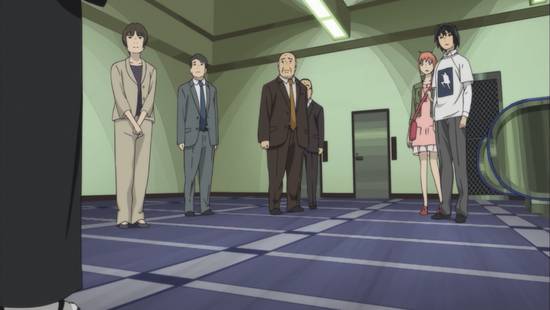
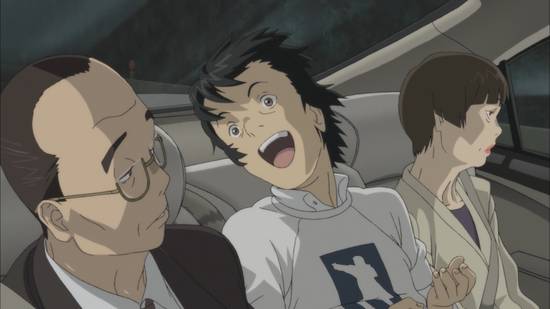
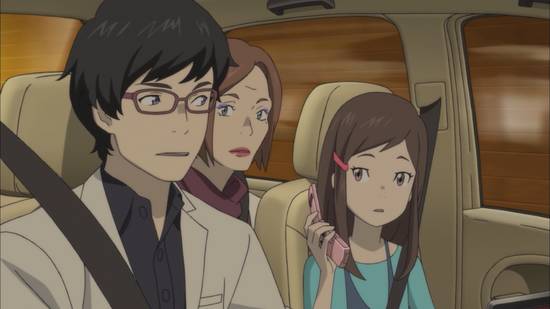
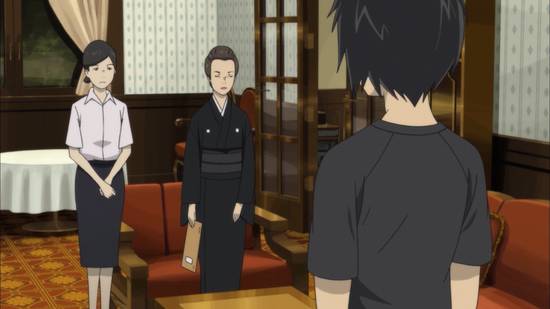
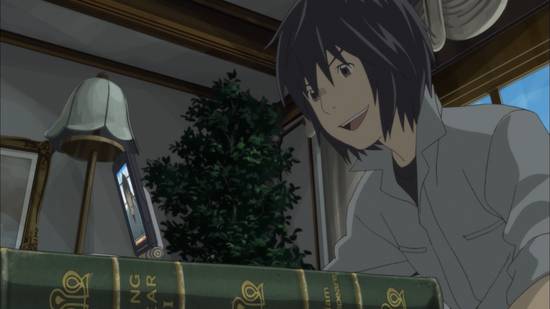
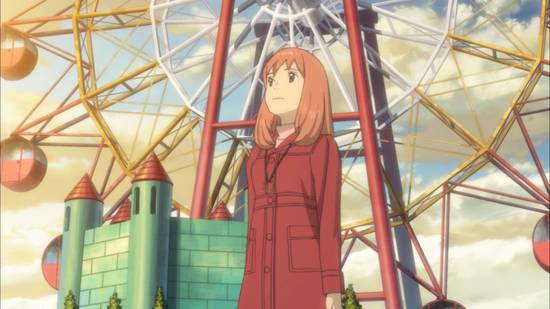
Your Opinions and Comments
Be the first to post a comment!